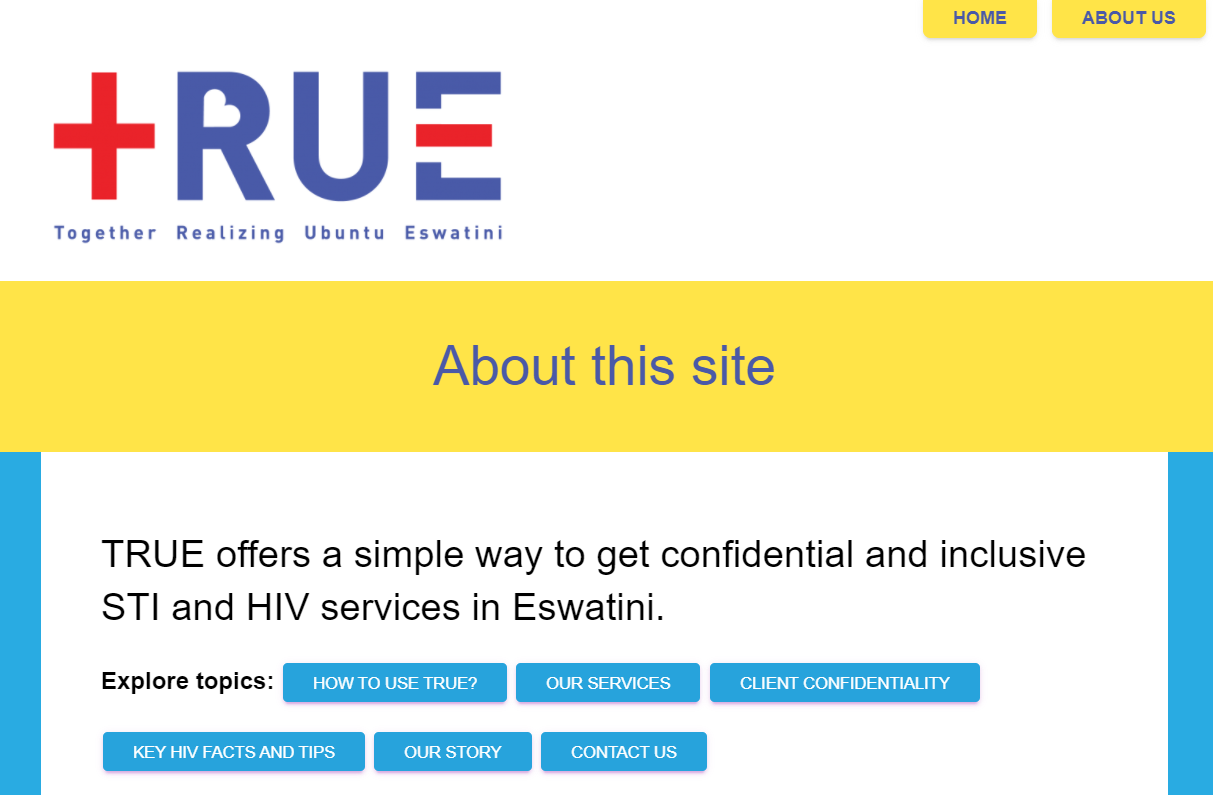Sicelo Mtsetfwa, Program Officer, Rock of Hope
Mangaliso Mndzabele, Virtual Outreach Worker, Rock of Hope
Philisiwe Dlamini, Senior Program Officer, EpiC, FHI 360
Sarah Muthler, Technical Writer, Research Utilization, FHI 360
For key population individuals who may feel pressured to hide their identity, the growth of internet and social media use in Eswatini has provided more confidential ways to learn about HIV testing and treatment. Mlungisi Lukhele,* 26, did not receive the help he needed when he sought treatment for a sexually transmitted infection (STI) at a government hospital after telling the provider that his sexual partner was a man. Later, he discovered Together Realizing Ubuntu Eswatini (TRUE), an online platform for learning about HIV and STI services and connecting to community centers and health clinics with providers trained to serve key population individuals.
“I met people who understand who I am and are friendly and more welcoming,” said Mlungisi, who also booked a virtual support service appointment. “I was tested and treated for STIs without many questions. I was able to talk about everything with the [psychosocial support staff] since it was online. I was healed emotionally.”
Several key population partner organizations, along with the Eswatini Ministry of Health, created TRUE with funding from the Key Populations Investment Fund provided through the Meeting Targets and Maintaining Epidemic Control (EpiC) project, supported by the U.S. Agency for International Development and U.S. President’s Emergency Plan for AIDS Relief. TRUE focuses on providing high-quality health services to key population members at higher risk of HIV acquisition, including men who have sex with men, female sex workers, transgender people, and people who inject drugs.
Khethakuthula Dlamini is an online outreach worker with the community-based organization The Rock of Hope (ROH) Eswatini, one of the partners that supports TRUE.
“TRUE Eswatini has been beneficial to key populations in Eswatini, especially because they face discrimination in public health units,” explained Khethakuthula, who has worked for ROH since 2015.
ROH was founded in 2012 to address health and human rights issues for the lesbian, gay, bisexual, transgender, and intersex (LGBTI) communities. The organization’s 13 employees use training, advocacy, and communication to influence changes in policy and social practices. ROH has used its KPIF share to implement Going Online activities that mobilize key population individuals to access HIV education, prevention, testing, and treatment services. For example, in some cases, ROH outreach workers do online booking for clients who do not have internet access. Other ROH activities include conducting short surveys to inform outreach and delivery, engaging social influencers, using social media mapping to plan outreach and service delivery, and using online social networks for outreach to key populations.
Khethakuthula said he and other ROH outreach workers received mobile devices and data bundles from ROH for their work. They use Facebook, Instagram, Twitter, YouTube, and the ROH website to raise awareness among LGBTI individuals of the services offered at TRUE. ROH also follows up with clients to ensure they attend their appointments and are satisfied with services.
Gugu Matse,* 20, a female sex worker in Manzini, met an ROH outreach worker who connected her to services at a TRUE community center. She found the experience different than appointments at other facilities.
“Being a sex worker is not easy in Eswatini,” Gugu noted. “I take PrEP [pre-exposure prophylaxis] and get refills there [TRUE community center], and now it’s my new home, as I can take a shower there for free. I do not need to pretend to be someone else when I get to the clinic. I go with my miniskirt, and they do not judge or discriminate against me; they respect my work as a sex worker.”
Improving outreach
Because of ROH’s social media outreach, the organization was well prepared to continue serving clients when the COVID-19 pandemic began. ROH is now expanding its messaging on gender-based violence (GBV).
“We are living in an era when GBV is rife in the country and can be hidden due to the same factors as homosexuality—stigma and discrimination. Also, because of COVID-19, a lot of people are sitting at home; there are no jobs. People are changed, so we’re always trying to create awareness [of services] to improve people’s lives.”
ROH is also seeking ways to connect with people who are not online or may want in-person interaction. The organization has hosted Pride events for several years and hopes to expand its presence at other community events. In addition, they are adding recreational space at their new office so that LGBTI individuals can gather in a safe and fun environment.
*Pseudonym

